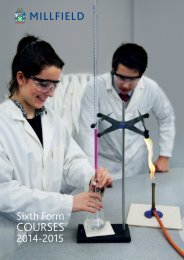COURSES
Create successful ePaper yourself
Turn your PDF publications into a flip-book with our unique Google optimized e-Paper software.
Physics<br />
Overview<br />
If you choose to study Physics you will learn<br />
something about the workings of nature – from the<br />
smallest sub-atomic particles to the processes at<br />
work in the largest stars and galaxies. Your<br />
imagination will be challenged and you will develop<br />
your ability to express ideas in writing and also your<br />
ability to handle the ‘language’ of mathematics.<br />
Physics at A level is a sound basis for careers in a<br />
wide range of fields such as physics research,<br />
engineering, the teaching profession, ICT, astronomy,<br />
medical physics and even areas such as molecular<br />
biology, finance, banking and government.<br />
The Physics A level course has been designed to<br />
provide a natural transition from the material<br />
covered at GCSE and to encourage and excite<br />
interest and enthusiasm for the subject.<br />
Approach<br />
You will be taught in a group of approximately<br />
12 pupils. Each group normally has two tutors –<br />
each teaching one half of the course. You will be<br />
encouraged to take an active interest in your learning,<br />
to be inquisitive about the physical world and to<br />
develop a determined approach to tackling problems<br />
and difficulties. Laboratory practical work plays a<br />
significant part in the structure of the course, with<br />
laboratory sessions held at regular intervals.<br />
Course outline<br />
AS<br />
Unit 1: Particles, Quantum Phenomena<br />
and Electricity.<br />
The nucleus including particles, antiparticles and<br />
photons; hadrons and leptons; quarks;<br />
photelectricity; wave-particle duality;<br />
electrical circuits.<br />
Unit 2: Mechanics, Materials and Waves.<br />
Mechanics, including motion along a straight line;<br />
projectiles; Newton’s Laws of Motion; properties<br />
of materials; waves - including diffraction and<br />
interference.<br />
Unit 3: Investigative and Practical Skills.<br />
A2<br />
Unit 4: Fields and Further Physics.<br />
Momentum; uniform circular motion; simple<br />
harmonic motion; gravitational and electrical fields;<br />
capacitors; electromagnetic induction.<br />
Unit 5: Nuclear and Thermal Physics<br />
plus Astrophysics.<br />
Probing the nucleus; nuclear instability; kinetic<br />
theory; optical and radio telescopes; Doppler Effect;<br />
Hubble’s Law; Quasars.<br />
Unit 6: Investigative and Practical Skills.<br />
You will work independently to produce a written<br />
report on each practical assignment. Practical work<br />
on a regular basis is intended to encourage you to<br />
display initiative in researching your experiments<br />
prior to the laboratory sessions, as well as to develop<br />
the skills of making careful observations and<br />
measurements, processing data, analysing results<br />
and evaluation – all of which are assessed in<br />
Units 3 and 6.<br />
Experiments will be set which will allow you to<br />
develop your ability to use IT skills in data capture,<br />
data processing and also when writing reports.<br />
74<br />
Millfield Sixth Form Courses 2014-2015



